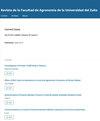Sustainability evaluation of sheep production in the páramo ecosystem of Cerrito Santander municipality, Colombia
IF 0.5
4区 农林科学
Q4 AGRONOMY
Revista De La Facultad De Agronomia De La Universidad Del Zulia
Pub Date : 2022-12-19
DOI:10.47280/revfacagron(luz).v40.n1.02
引用次数: 0
Abstract
The preservation of natural resources and the production of enough food to meet the demands of a growing human population, will be one of the most important challenges that the world will have to face in the coming years, hence the need to promote the sustainable use of the resources. The objective of this research was to evaluate the sustainability of the sheep production system in the páramo ecosystem, municipality of Cerrito-Santander, Colombia. A survey was applied to 15 sheep farmers, allowing the characterization of the production system and the georeferencing of farms. This information was analyzed by applying descriptive statistics, using SPSS software, version 24, this allowed to present the most relevant aspects of sheep production in the sector. Participatory workshops were held with the producers, to select and evaluate the sustainability indicators of sheep production systems in the páramo area, which were visualized by a biogram or spider web graph. Finally, strategic guidelines were formulated to respond to the critical points of sheep production. Most producers prefer the commercialization of wool and the use of the animal's discarded stages to obtain economic income from the sale of meat. Critical points (food supplements, type of state support received, use of veterinary services and use of energy sources) and favorable points (cost of raw materials, food security and water sources) were evidenced for the economic, social and environmental dimensions. It is necessary to focus attention on the critical points and apply the strategic guidelines, since together with the favorable points they will allow generation and establishment of more sustainable sheep production systems.哥伦比亚CerritoSantander市páramo生态系统中绵羊生产的可持续性评价
保护自然资源和生产足够的粮食以满足日益增长的人口的需要,将是世界在今后几年必须面对的最重要的挑战之一,因此需要促进可持续地利用资源。本研究的目的是评估哥伦比亚塞里托-桑坦德市páramo生态系统中绵羊生产系统的可持续性。对15个牧羊户进行了调查,从而确定了生产系统的特征和农场的地理参考。这些信息通过应用描述性统计分析,使用SPSS软件,版本24,这允许呈现该部门羊生产的最相关方面。与生产者举行了参与性讲习班,以选择和评价páramo地区绵羊生产系统的可持续性指标,这些指标以生物图或蜘蛛网图可视化。最后,制定了应对绵羊生产关键点的战略指导方针。大多数生产者倾向于将羊毛商业化,并利用动物被丢弃的阶段,从出售肉类中获得经济收入。在经济、社会和环境方面证明了关键点(食品补充、获得的国家支持类型、兽医服务的使用和能源的使用)和有利点(原材料成本、粮食安全和水源)。有必要将注意力集中在关键点上并应用战略指导方针,因为它们与有利点一起将有助于产生和建立更可持续的绵羊生产系统。
本文章由计算机程序翻译,如有差异,请以英文原文为准。
求助全文
约1分钟内获得全文
求助全文
来源期刊
CiteScore
0.50
自引率
0.00%
发文量
45
审稿时长
>12 weeks
期刊介绍:
La Revista de la Facultad de Agronomía de la Universidad del Zulia publica artículos científicos, notas técnicas, comunicaciones rápidas y artículos invitados originales e inéditos, es decir, que no hayan sido publicados ni enviados simultáneamente a otra revista para su publicación, de autores interesados en el campo agrícola vegetal y agrícola animal. De presentarse el caso que el autor o autores hubiesen enviado o publicado su manuscrito simultáneamente en otra revista, podrán ser sancionados con la no publicación en esta revista por tiempo indefinido.
Se admiten manuscritos escritos en idioma Español, Portugués o Inglés, con un resumen en Español o Portugués y otro en Inglés (Abstract).

 求助内容:
求助内容: 应助结果提醒方式:
应助结果提醒方式:


